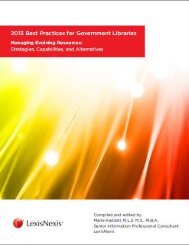2012 Best Practices for Government Libraries
2012 Best Practices for Government Libraries
2012 Best Practices for Government Libraries
You also want an ePaper? Increase the reach of your titles
YUMPU automatically turns print PDFs into web optimized ePapers that Google loves.
46<br />
BEST PRACTICES <strong>2012</strong><br />
that degree of personal discom<strong>for</strong>t in order to break out of my com<strong>for</strong>t zone and discover<br />
more about the education world.<br />
So I did a whole lot of listening, soaking up in<strong>for</strong>mation, meeting amazing and dedicated<br />
educators, and becoming aware of ideas common to the field. During those three days, I<br />
took part in keynotes, panels, interactive workshops, carousels (we went from table to<br />
table hearing about different programs), and visited an alternative school. Highlights<br />
included a session on Project Ki’L, a Title VII Indian Education program located in<br />
Anchorage, AK, serving over 500 Alaska Native and American Indian boys in 12 schools<br />
where Alaska natives are in the minority. During the carousel sessions, I was extremely<br />
impressed by three enthusiastic principals from the Winfree Academy, a Texas charter<br />
school group that practiced what one speaker called “excuse prevention,” meaning that<br />
they worked around whatever problem could stop a kid from graduating (pregnancy,<br />
addictions, money woes, and more).<br />
Topping it all was a site visit to a stand-alone alternative school, part of the Communities<br />
In Schools (CIS) organization. Greeted by everyone in this small school, student escorts<br />
proudly showed us around a new, clean facility. We heard about GED preparation, career<br />
readiness, pregnancy planning, and literacy consultants. We viewed instruction using a<br />
self-paced computer program, as well as a science lab, a gym class, and a social studies<br />
class. The kids were raw and honest when they spoke to us during a lunch prepared by a<br />
culinary program in another CIS school.<br />
At NDPC, I discovered how closely the dropout issue relates to other educational problems<br />
and to real world issues that are often glossed over in reports about school failures.<br />
Bullying, poverty, peer pressure, learning disabilities, family disorder, and feeling trapped<br />
at school all contribute to failing grades, non-attendance and dropping out. At the final<br />
keynote, along with moving testimonies from teens who had dropped out and found their<br />
way back to school, I heard the Mayor of Philadelphia and his wife speak about<br />
Philadelphia’s dedication to keeping kids in school through the city's Re-Engagement<br />
Center.<br />
As the only librarian in the room, I was a witness to great work. As an adult at a<br />
conference to absorb in<strong>for</strong>mation about a new field, I was the model of a lifelong learner.<br />
Now whenever people tell me that schools are failing and no one is trying to help kids, I<br />
can look them in the eye and tell them that’s not really the case. There are many reasons<br />
kids aren’t doing well, but there are also thousands of educators around this country who<br />
are working hard to help them succeed. I think of all these educators as I do my research<br />
at the National Library of Education. In fact, I’ve brought their motivation and<br />
commitment back to my work as a research librarian.<br />
Stacie Marinelli is a Research Librarian at the National Library of Education in the U.S.<br />
Department of Education and a contractor with Progressive Technology Federal Systems,<br />
Inc. (PTFS).



